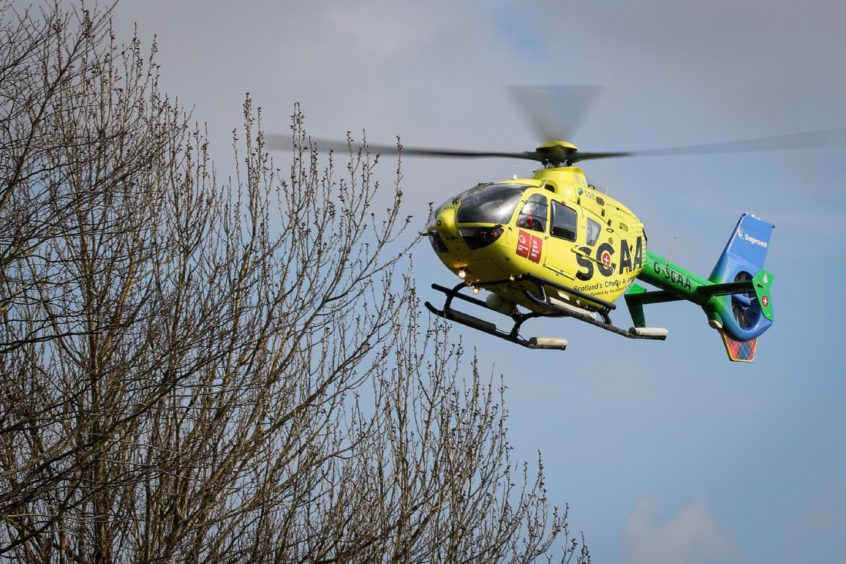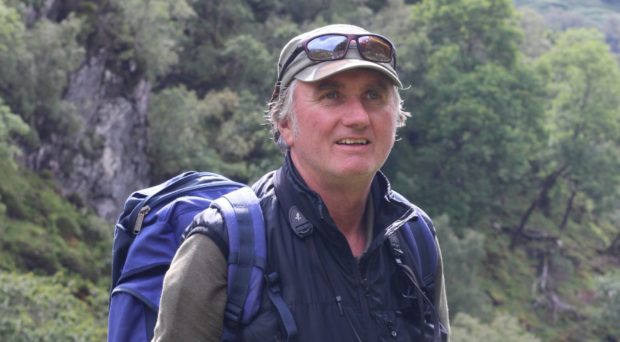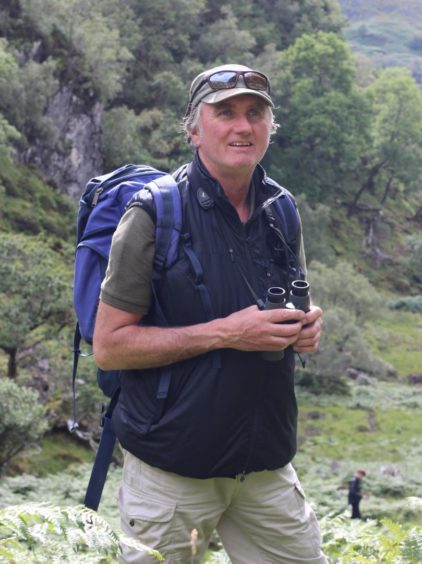A man “died” seven times as he was airlifted to hospital after suffering a devastating heart attack in the Perthshire countryside.
Father-of-three Duncan Stevenson had to be repeatedly resuscitated by a Helimed crew as they raced through treacherous wintry storms towards Ninewells Hospital in Dundee.
Now fully recovered, the 57-year-old has thanked his rescuers at the Perth-based charity SCAA (Scotland’s Charity Air Ambulance).
“I owe them my life,” he said.
Battling through heavy snow, poor visibility and the threat of icing-up, helicopter pilot Captain Shaun Rose – with more than 10,000 missions already under his belt – described it as “the most difficult flight of my life”.
A quiet morning stroll
Mr Stevenson, a countryside management consultant from Biggar, was in Highland Perthshire for an ex-colleague’s leaving do when tragedy struck.
It happened in February 2020, as Storm Dennis hammered rural parts of the country.
“I had met people the night before at Killin,” he said.
“The following morning, a few of us decided to go for a walk to Falls of Dochart and round the top of Loch Tay.
“I started to feel strange and thought it was a migraine coming on and then it got worse.”
“I couldn’t walk any further, I felt quite ill. I was with three other men and they were growing increasingly concerned.”
Unable to walk back to their guesthouse in Killin, one of his friends called out to a nearby farmer and arranged a lift back to the village through flooded roads.
An ambulance was scrambled from Crieff.
“My chest was getting tighter and pains were getting worse,” Mr Stevenson said.
“When the ambulance arrived they told me I was having a heart attack.
“They said I had to get to hospital quickly and that we needed an air ambulance.”
By this time, the weather had deteriorated further and the paramedics drove through heavy snow and howling winds to meet the SCAA crew at a rendezvous spot near Lochearnhead.
Mr Stevenson said: “We both arrived at much the same time and I was transferred to the aircraft.
“The crew was really reassuring. They said they were going to try to get me through to hospital in Dundee.
“Then I had my first arrest.”
Mr Stevenson said there was only “vague clips of memory” of what happened next.

Shocked back to life – seven times
Paramedics used the onboard defibrillator to shock his heart back to a steady rhythm.
Lead paramedic John Pritchard said: “Although he was sitting up and talking to us, the patient’s condition did give cause for concern and we set out all the appropriate cardiac life-saving and resuscitation kit we might need ready to act quickly.
Mr Stevenson went on to “die” a further six times in mid-flight, as Captain Rose steered through worsening conditions.
The crew resuscitated their repeatedly arresting patient, carrying out CPR, airway management and ventilating, but each time Mr Stevenson came round, he re-arrested just minutes later.
“We were so focused on our patient that – although we were well aware of the challenges Shaun was facing – we had plenty going on ourselves,” said Mr Pritchard.
Thanks to the in-flight care, Mr Stevenson was not only alive when he touched down at Ninewells, he suffered no brain function issues. He was rushed to the hospital’s catheter lab for treatment.
“The paramedics were great,” said Mr Stevenson.
“They kept asking if I was alright and reassuring me that we would get through to the hospital, and that everything would be okay.
“I don’t remember much after that, apart from coming too occasionally and experiencing the helicopter team being buffeted by the extreme weather.”
The road to recovery
Mr Stevenson was in hospital for three days and needed emergency surgery to fit a stent inside a problematic artery.
“I was sitting up in bed later that first evening piecing together what had happened and thanking my lucky stars that SCAA was there for me,” he said.
“One of the medical team at Ninewells told me how lucky I was to have been brought by helicopter, as I had arrested several times and needed to get to critical hospital care pretty quickly.
“A road ambulance in that weather, with me constantly arresting, would never have made it in time.”
Mr Stevenson said he doubted he would have made it without the air ambulance crew’s expertise.
“You see the helicopter at different places or read about it in the press but you don’t realise just what an amazing job this charity does until you’re on the receiving end of their life-saving work,” he said.
“They are amazing – they deserve every award and recognition going.”

